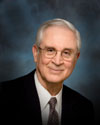 Click to Print Adobe PDF
Click to Print Adobe PDF
Winter 2008 - Vol.3, No.4
IN THE WORLD OF MEDICINE, IT'S ALWAYS CHANGE WE BELIEVE IN
Lawrence I. Bonchek, M.D., F.A.C.S., F.A.C.C.
Editor-in-Chief
|
 |
“Be not the first by whom the new are try’d – Nor yet the last to lay the old aside.”
Alexander Pope, 1688–1744
In the practice of medicine, Pope’s admonition is usually a wise guide, since the clinician is constantly bombarded with the “new and improved.” We get the message in such an unremitting barrage that St. Jude Medical, Inc.,™ manufacturer of the largest selling mechanical prosthetic heart valve, took advantage of the cliché to point out that its own valve was so successful that it had not been necessary to change its design since it was first introduced. They ran an ad that simply showed a picture of the valve with the somewhat sardonic caption “Not New, Not Improved.”
But this season, with the coming inauguration of a new President whose election was based on the American people’s longing for “change we can believe in,” I was struck by how much the articles and interviews in every issue of this Journal are tied together by the theme of “change.” For medical journals that contain predominantly original research, that point does not need emphasis. But JLGH publishes so many review articles (our subtitle is, after all, a “Record of Medical Progress”), that it may not be obvious how much we are focused on the new and innovative in medicine.
Take this issue. Drs. Ripchinski and Eichelberger provide a comprehensive overview of Electronic Medical Records. This is a change some of us may not believe in, but we will not be asked for our opinion. EMRs are coming, and it is only a question of whether we adopt them ahead of the curve, or await a Federal mandate.
Dr. Chad Rodenberger discusses a seemingly radical change in renal dialysis – home hemodialysis (you read that correctly – not peritoneal). It is made possible by changing technology, cost considerations, consumer sophistication, and better documentation of the benefits of more frequent dialysis, which is not feasible in protocols that rely on dialysis centers.
Dr. Janine Castle-Young and Dr. John Schantz discuss, respectively, how the approaches to prevention of postpartum depression, and reconstruction after surgery for breast cancer, have changed.
On the audio CD, which some readers mystifyingly still think is merely a recap of the print journal’s contents, I talk with Dr. Paul Sieber about how he managed to change the organization of his busy clinical practice of Urology so that he can conduct extensive clinical research simultaneously. And finally, I talk with Dr. Henry Wentz, who has been head of the Edward Hand Society about the changes in medical practice over the past century that he and his colleagues have documented in a collection of equipment and in displays at Lancaster General Hospital.
Surely, in medicine, regardless of our political leanings, change is something we believe in.